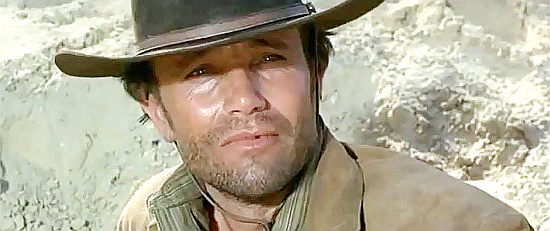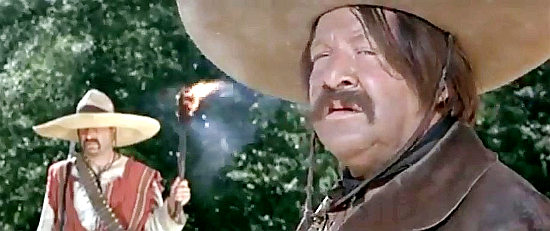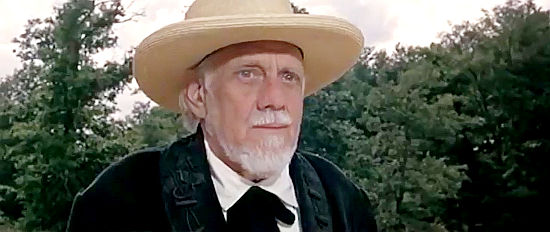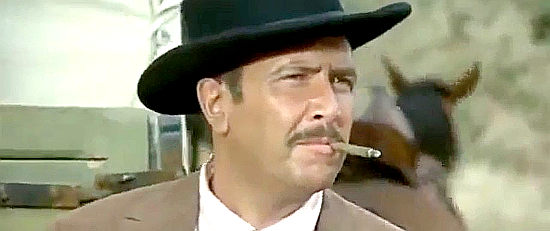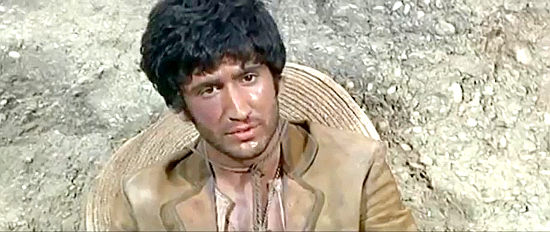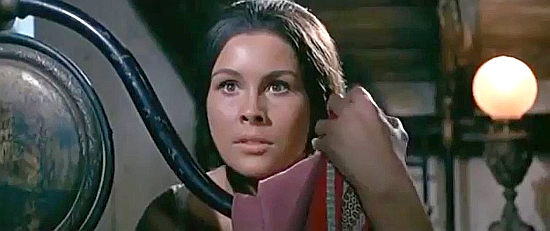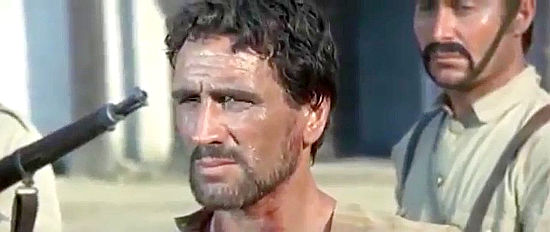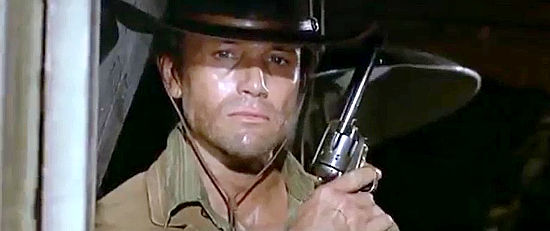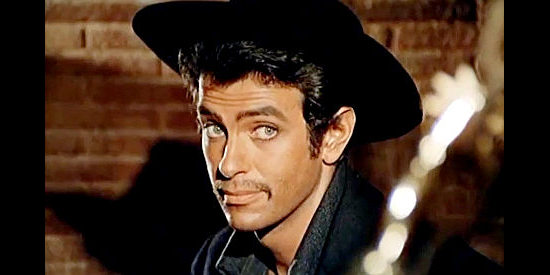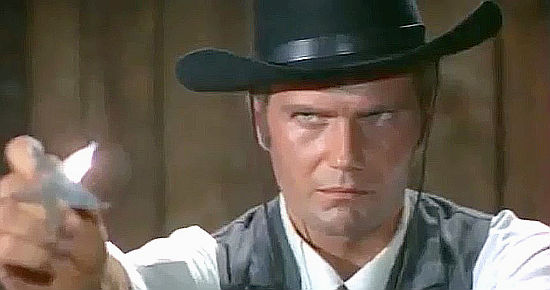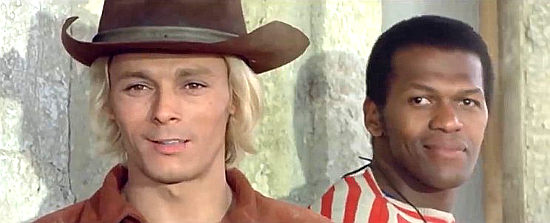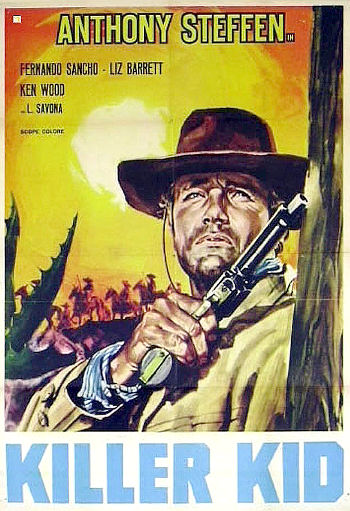 The U.S. Army has a pair of problems on its hand, one threatening peace with Mexico, the other threatening the commanding officer’s chance of being promoted.
The U.S. Army has a pair of problems on its hand, one threatening peace with Mexico, the other threatening the commanding officer’s chance of being promoted.
The former involves gun-running. Someone is stealing U.S. Army arms shipments and selling them to the revolutionaries south of the border.
The latter involves a jailbreak. Killer Kid (Anthony Steffen) — one of the West’s most notorious gunslingers — was locked up at the army post. Now he’s escaped.
The problems merge when Killer Kid stumbles upon an ambush and saves the life of a young revolutionary named Pablito.
Grateful, he agrees to take Killer Kid to meet El Santo, the man behind the revolution in that area, the man the regular Mexican army is trying desperately to find.
Killer Kid proves useful in preventing the slaughter of innocents by Mexican officer Ramirez and his men while they’re searching for El Santo.
But Vilar, another of the revolution’s leaders, wonders if the Gringo can be trusted.
His mistrust isn’t misguided. Killer Kid isn’t who he pretends to be. In fact, he has a mission that might be counter to what the revolutionaries would like.
But now he faces a dilemma: He’s grown to appreciate their plight. And he’s fallen for El Santo’s lovely niece Mercedes (Luisa Baretto).

Luisa Baratto (Liz Barrett) as Mercedes Hernandez, with something to smile about thanks to Killer Kid in Killer Kid (1967)
This revolution-focused Spaghetti can’t compare to “Bullet for a General” or “Tepepa,” but it’s done well enough to be worth a watch.
The final assault on the Mexican regular army camp is particularly well done. And you’re likely to remember the scene in which Killer Kid agrees to prove his identity by shooting a coin from his lover’s hand at 30 paces.
Director Leopoldo Savona also gives Steffen plenty of chances to demonstrate his roll-and-shoot and spin-and-shoot capabilities.
Meanwhile, Fernando Sancho has an interesting part that doesn’t quite work. First, he’s willing to steal a wagon load of guns for his own gain, then he’s questioning Killer Kid’s loyalty.
In between, he’s the revolutionary always balking, eager to attack while El Santo argues that patience is the wiser course of action. And he pines for a female revolutionary named Delores who can’t stand his touch.
Directed by:
Leopoldo Savona
Cast:
Antonio De Teffe …. Killer Kid / Capt. Morrison
as Anthony Steffen
Luisa Baratto … Mercedes Hernandez
as Liz Barrett
Fernando Sancho … Vilar
Giovanni Cianfriglia … Ramirez
as Ken Wood
Howard Nelson Rubien … El Santo
Virginia Darval … Dolores
as Virgan Darwal
Adriano Vitale … Ortiez
Domenico Cianfriglia … Felipe
Burno Arie … Chico
Yorgo Voyagis … Pablo
Also with … Valentino Macchi, Ugo Adinolfi, Consalvo Dell’Arti, Fedele Gentile, Luciano Doria, Tom Felleghy, Renzo Pevarello, Fortunato Arena, Remo Capitani, Rinaldo Zamperla, Marcello Meconizzi, Alberigo Donadeo, Franco Ukmar, Omero Capanna
Runtime: 102 min.
aka:
Chamaco
Captain Morrison
Music: Berto Pisano
Memorable lines:
El Santo: “You definitely don’t have the manners of a killer.”
Killer Kid: “You can also kill a man with good manners.”
El Santo: “What I don’t understand yet is why a callous man like you is willing to risk his life for a cause that’s not his own.”
Killer Kid: “An instinct that’s stronger than I am. And, besides, I was born with a revolutionary’s soul.”
El Santo: “And there might not be a more practical reason?”
Killer Kid: “I’m doing it for the money.”
Killer Kid: “Listen, Mercedes … I saw these poor farmers die. Men and woman, without a cry. With courage. I always thought they were tramps without dignity, without ideals. But they died like soldiers.”
Trivia:
* This was apparently the only Spaghetti Western for Howard Nelson Rubien, the elderly actor playing the role of the revolutionary leader El Santo.
* Luisa Baratto made her film debut in 1965’s “Bloody Pit of Horror.” She wound up appearing in five Spaghetti Westerns in just a two-year span, also showing up in “Kill and Pray” and “Payment in Blood” (both 1967) and “The Long Day of the Massacre” and “Two Pistols and a Coward” (both 1968).
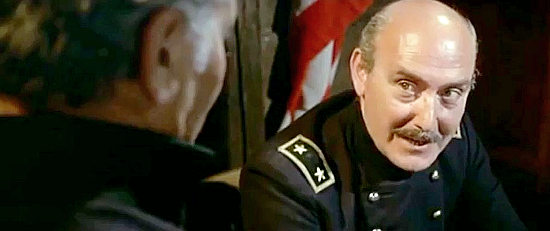
Cansalvo Dell’Arti as the major who dispatches Capt. Morrison on his dangerous mission in Killer Kid (1967)
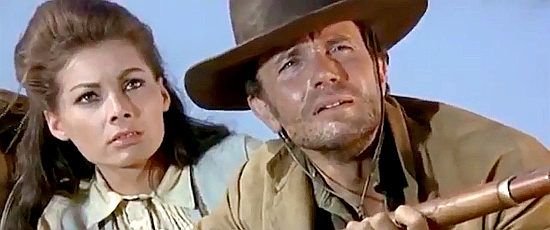
Luisa Baratto (Liz Barrett) as Mercedes Hernandez and Anthony Steffen as Killer Kid locate the guns in Killer Kid (1967)
